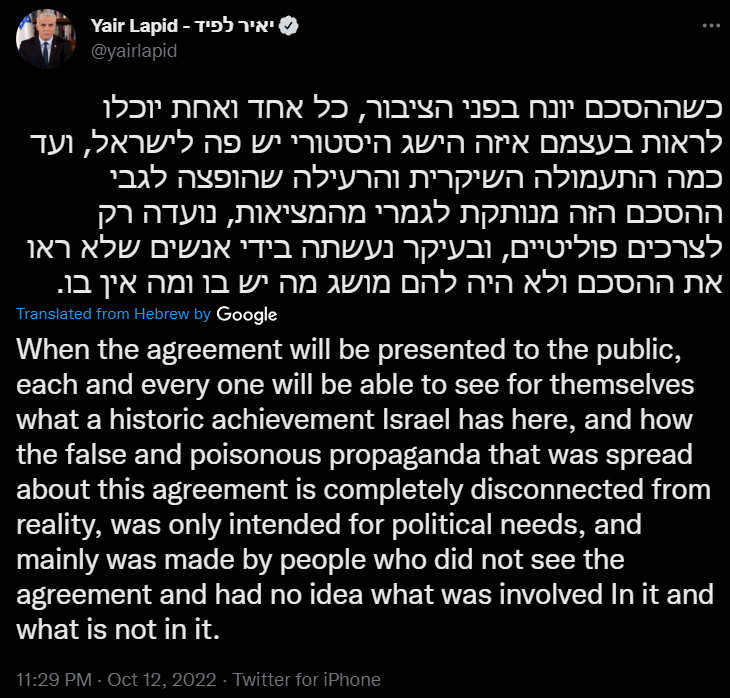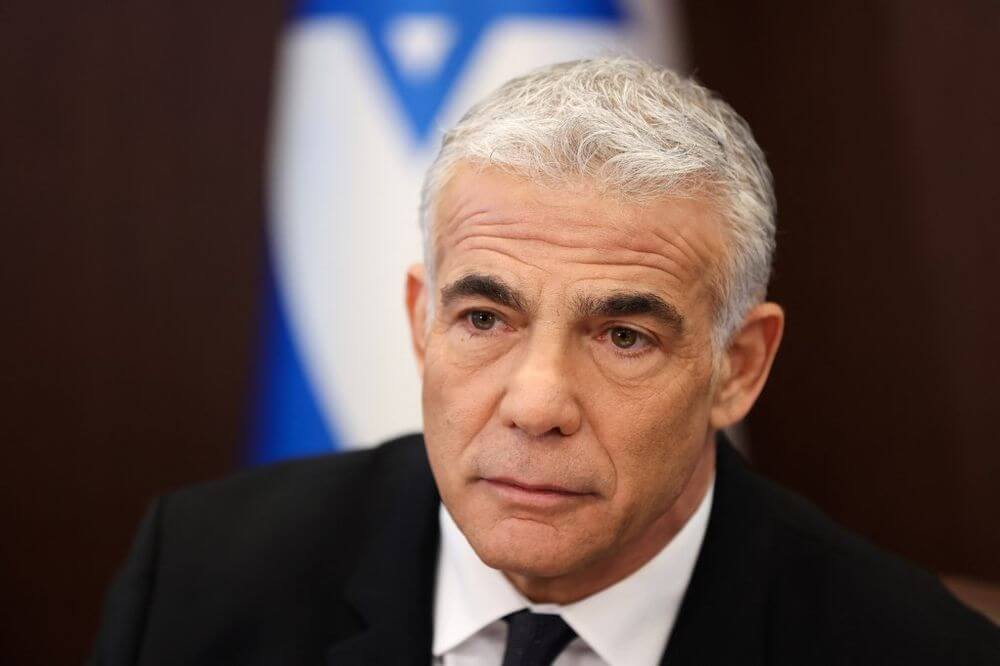Israel on Wednesday approved a landmark United States (US)-brokered deal with Lebanon to resolve their decades-long maritime border dispute over their exclusive economic zones (EEZs) in the Mediterranean.
Prime Minister (PM) Yair Lapid’s office said that an “overwhelming majority” of the government had approved the principles of the agreement, which have not yet been made public. “The government expressed their support for the importance and necessity of the maritime agreement with Lebanon at this time,” the PMO said, noting that the government sent the agreement to the Knesset for review and final approval.
Israel’s security cabinet also voted in favour of the maritime deal and called on the Knesset to approve it quickly, given its “importance and urgency.”

Lapid welcomed the agreement, saying it preserves the security of communities in the north [of Israel] as well as the freedom of action of the IDF [Israel Defence Forces] and the Israeli Navy’s control of the area closest to the shoreline.”
“This agreement staves off the possibility of a military clash with Hezbollah,” Lapid noted, while at the same time stressing that “Israel is not afraid of Hezbollah” and that it remains ready to “deal them a heavy blow” in the event of a conflict. “That being said, if it is possible to prevent war, it is the job of a responsible government to do so,” he emphasised.
However, he noted that Israel would not delay gas production from the disputed Karish natural gas field. “The Karish field is in our sovereign territory, and an attack on it is an attack on the State of Israel. We will not hesitate for a second to use force to defend our gas field,” he stressed, adding, “This deal secures the energy security of the State of Israel and will bring in billions in revenue that every family in Israel will benefit from.”
1 \ BREAKING: Read here the full maritime border agreement between Israel and Lebanon pic.twitter.com/Qucmkz2GFO
— Barak Ravid (@BarakRavid) October 12, 2022
He underscored that the deal also benefits Lebanon, which will now be able to operate the Qana-Sidon offshore gas field. He noted that Israel would receive 17% of the profit from the Qana-Sidon field.
Lebanese President Michel Aoun also praised the deal, saying it would help alleviate Lebanon’s economic crisis and is therefore a “gift to the Lebanese people.” Aoun said the deal achieved what other efforts could not do to pull Lebanon out of its misery.
He said that despite receiving aid from the international community, Lebanon could not do much to end its economic woes. In this regard, Aoun expressed confidence that the deal with Israel would “pull Lebanon out of the abyss it was thrown into” by allowing it to extract oil and gas from the Mediterranean.
BREAKING: Mossad director David Barnea said at the security cabinet meeting today that people who claim the maritime border agreement is a win for Hezbollah know nothing about the situation in Lebanon. IDF chief of staff Kohavi added the agreement is not good for Nasrallah
— Barak Ravid (@BarakRavid) October 12, 2022
In fact, following the announcement that the two countries had agreed to a deal, Lebanese PM Najib Mikati met with representatives of French energy company TotalEnergies and urged the company to “immediately begin taking operational steps to drill in Lebanese waters.”
The deal was also welcomed by the Lebanese militia group Hezbollah, which had threatened to launch missiles towards the Karish field if Israel denied Lebanon’s right to drill in the disputed area. Hezbollah chief Hassan Nasrallah said that his Israel agreed to the deal because of the pressure exerted by his group. “Tonight, we will not issue threats. Tonight, there will only be joy and clapping,” Nasrallah remarked.
Israel and Lebanon have long been at loggerheads regarding claims over coastal drilling and exploration rights in the Mediterranean Sea. While both sides started negotiations brokered by the United States and the United Nations in 2011 that focussed on around 860 square kilometres, Lebanon claimed an additional area of 1,430 square kilometres in 2020.
5 things you should know about the Israel-Lebanon maritime agreement: pic.twitter.com/P9acdwAXND
— Prime Minister of Israel (@IsraeliPM) October 12, 2022
In June, Lebanon condemned the arrival of the Greek floating gas production rig Energean Power in Israel to commence operations at Karish. Aoun warned Israel that any action or activity in the disputed area would constitute a “provocation” and a “hostile act.”
In 2014, Israel granted Energean a license to operate Karish till 2044. Karish, Hebrew for shark, is estimated to contain 1.4 trillion cubic feet of proven and probable gas reserves.

